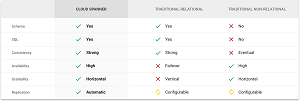News
Google Database Service Spans Relational, NoSQL Models
- By David Ramel
- February 16, 2017
Google launched a public beta for a new global database service that features both the consistency of the relational model and the scaling and data functionality of NoSQL offerings.
Called Cloud Spanner, the new managed service for the Google Cloud Platform is targeting enterprise mission-critical applications.
The public beta was some 10 years in the making, as Google engineers in 2007 began an effort to break the dichotomy between traditional SQL-based relational database management system (RDBMS) models and the new upstart NoSQL model that emphasizes scalability and data distribution needed for new-era Big Data analytics.
"For decades, developers have relied on traditional databases with a relational data model and SQL semantics to build applications that meet business needs," Google product manager Deepti Srivastava said in a blog post Tuesday. "Meanwhile, NoSQL solutions emerged that were great for scale and fast, efficient data-processing, but they didn't meet the need for strong consistency.
"Faced with these two sub-optimal choices that customers grapple with today, in 2007, a team of systems researchers and engineers at Google set out to develop a globally-distributed database that could bridge this gap. In 2012, we published the Spanner research paper that described many of these innovations. The result was a database that offers the best of both worlds."
 [Click on image for larger view.]
Cloud Spanner Comparison (source: Google)
[Click on image for larger view.]
Cloud Spanner Comparison (source: Google)
Benefits of the managed service highlighted by Google include:
- Developers can focus on application logic instead of spending valuable time managing hardware and software.
- RDBMS solutions can scale out without complex sharding or clustering.
- Users gain horizontal scaling without migration from relational to NoSQL databases.
- Enterprises can maintain high availability and protect against disaster without needing to engineer a complex replication and failover infrastructure.
- It provides integrated security with data-layer encryption, identity and access management and audit logging.
"Cloud Spanner keeps application development simple by supporting standard tools and languages in a familiar relational database environment," Srivastava said. "It's ideal for operational workloads supported by traditional relational databases, including inventory management, financial transactions and control systems, that are outgrowing those systems. It supports distributed transactions, schemas and DDL statements, SQL queries and JDBC drivers and offers client libraries for the most popular languages, including Java, Go, Python and Node.js."
Pricing details are here.
About the Author
David Ramel is an editor and writer at Converge 360.